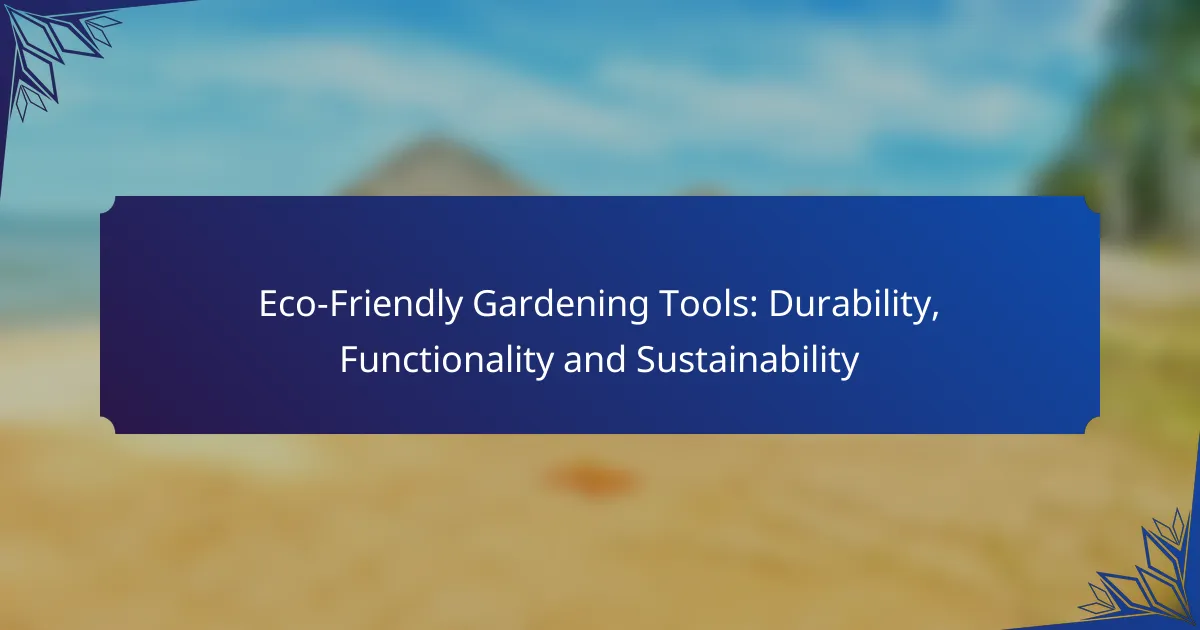Eco-friendly gardening tools are designed to provide durability, functionality, and sustainability, making them an excellent choice for environmentally conscious gardeners. Crafted from sustainable materials like recycled metals and bamboo, these tools not only withstand regular use but also minimize environmental impact. By enhancing usability and efficiency, they make gardening tasks easier while promoting responsible resource use and reducing waste.
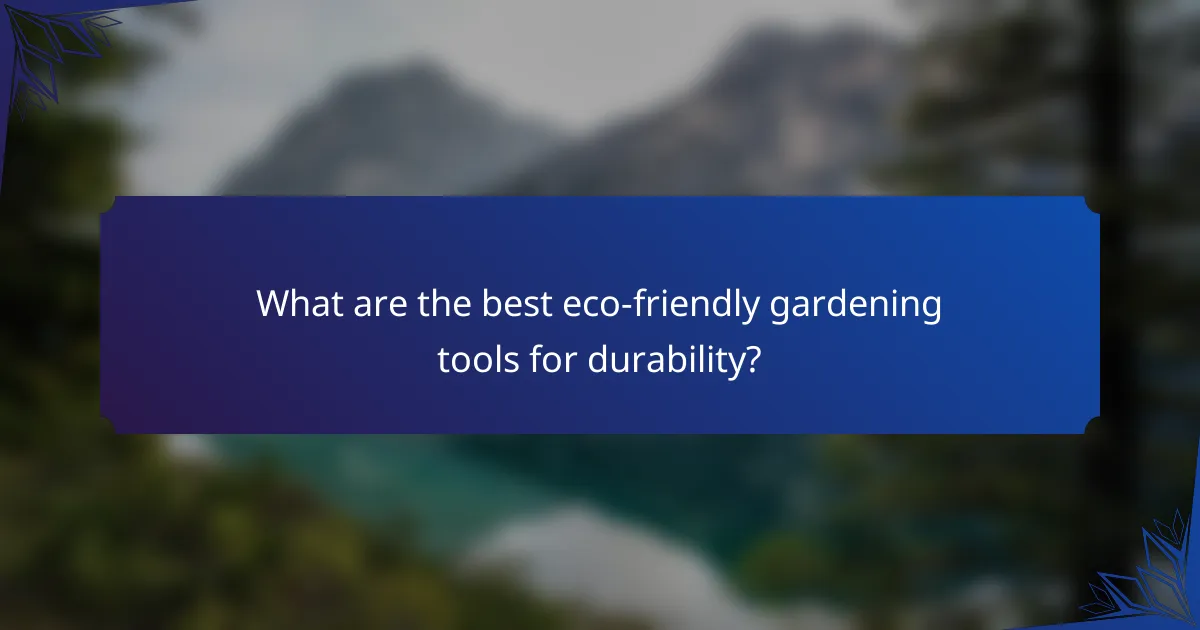
What are the best eco-friendly gardening tools for durability?
The best eco-friendly gardening tools for durability are those made from sustainable materials that can withstand regular use while minimizing environmental impact. Look for tools crafted from recycled metals, bamboo, or other renewable resources, as they often offer both longevity and functionality.
Fiskars Eco-Friendly Pruners
Fiskars eco-friendly pruners are designed with sustainability in mind, featuring blades made from recycled steel and handles crafted from post-consumer recycled plastic. These pruners are not only durable but also ergonomically shaped, providing comfort during extended use.
When selecting Fiskars pruners, consider models with replaceable parts to extend their lifespan. Regular maintenance, such as cleaning and sharpening the blades, will enhance their performance and durability over time.
Radius Garden Ergonomic Hand Tools
Radius Garden offers a range of ergonomic hand tools made from recycled materials, ensuring both durability and comfort. Their tools feature soft-grip handles that reduce hand fatigue, making them ideal for prolonged gardening tasks.
These tools are designed to last, with rust-resistant stainless steel heads that can handle tough soil conditions. Look for sets that include trowels, weeders, and cultivators to cover various gardening needs efficiently.
Garden Weasel Compost Aerator
The Garden Weasel Compost Aerator is a sustainable tool designed to improve composting efficiency by aerating organic matter. Made from durable materials, it features a unique design that allows for easy turning and mixing of compost piles.
Using this aerator can significantly speed up the decomposition process, resulting in rich compost for your garden. To maximize its effectiveness, aerate your compost pile every few weeks, ensuring proper airflow and moisture balance.
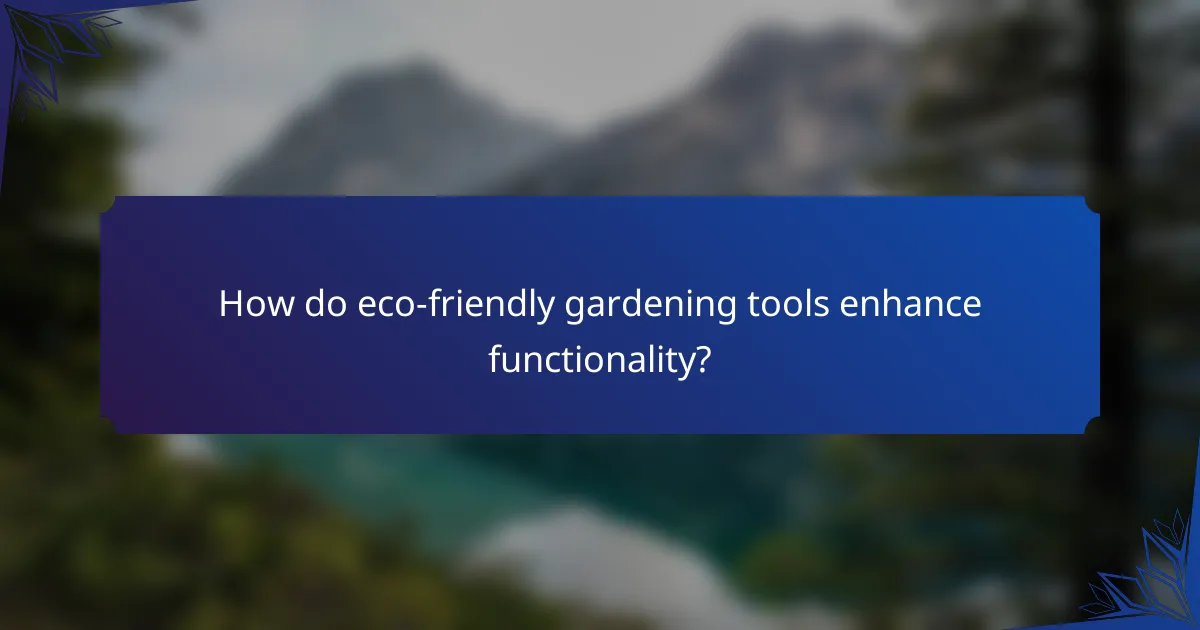
How do eco-friendly gardening tools enhance functionality?
Eco-friendly gardening tools enhance functionality by combining durability with sustainable materials, allowing for effective gardening while minimizing environmental impact. These tools often feature designs that maximize usability and efficiency, making gardening tasks easier and more enjoyable.
Multi-Functionality of Tools
Many eco-friendly gardening tools are designed to serve multiple purposes, reducing the need for a large collection of equipment. For example, a hand trowel may include measurements for planting depth, while a spade can double as a weed remover.
This multi-functionality not only saves space but also cuts down on costs, as gardeners can invest in fewer tools that perform various tasks. Look for tools that combine features like digging, cutting, and weeding to streamline your gardening experience.
Lightweight and Easy to Use
Eco-friendly gardening tools are often made from lightweight materials, making them easier to handle for extended periods. For instance, tools made from bamboo or recycled plastics can significantly reduce fatigue during gardening sessions.
When selecting tools, consider those with ergonomic designs that fit comfortably in your hand. This can enhance your control and precision, making tasks like planting and pruning more efficient and enjoyable.
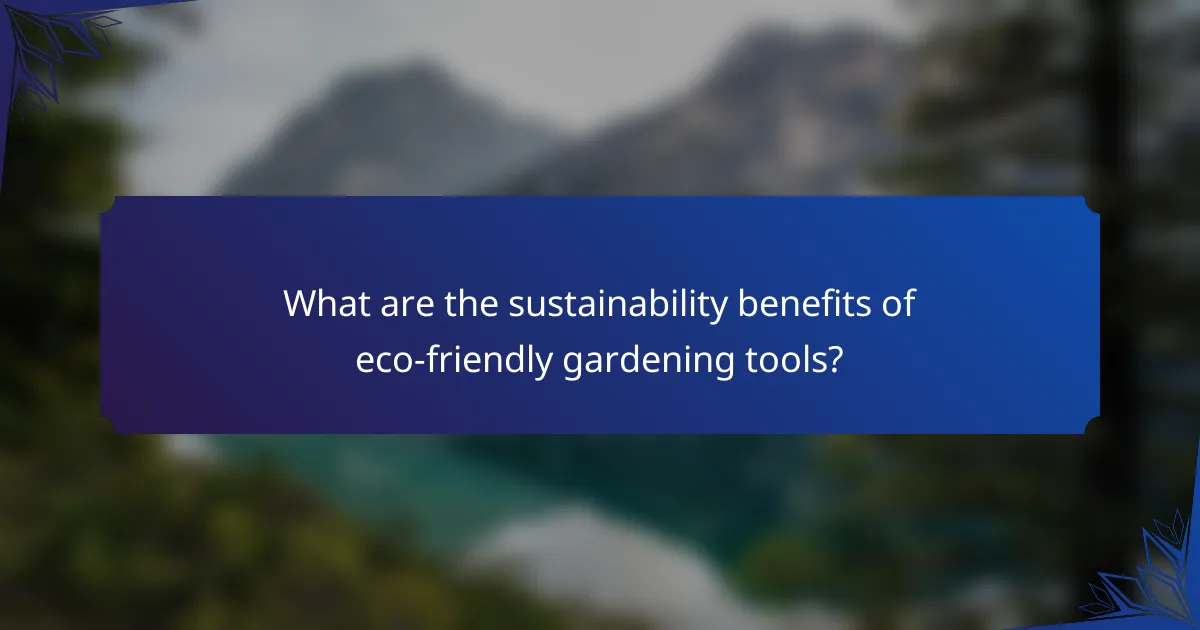
What are the sustainability benefits of eco-friendly gardening tools?
Eco-friendly gardening tools offer significant sustainability benefits by reducing environmental impact and promoting responsible resource use. These tools are designed to minimize waste, lower carbon emissions, and utilize materials that are less harmful to the planet.
Reduced Carbon Footprint
Using eco-friendly gardening tools can significantly lower your carbon footprint. These tools are often made from sustainable materials and produced through environmentally conscious methods that require less energy. For example, tools crafted from recycled metals or sustainably sourced wood contribute to reduced greenhouse gas emissions compared to traditional options.
When selecting gardening tools, consider those that are locally manufactured to further decrease transportation emissions. Supporting local artisans or companies can enhance the sustainability of your gardening practices.
Biodegradable Materials
Many eco-friendly gardening tools are made from biodegradable materials, which break down naturally over time, reducing landfill waste. For instance, tools made from bamboo or bioplastics can decompose without leaving harmful residues, unlike their plastic counterparts that can take hundreds of years to break down.
When choosing biodegradable tools, look for certifications or labels indicating their environmental friendliness. This ensures that the materials used are genuinely sustainable and safe for the ecosystem, helping to maintain soil health and biodiversity in your garden.
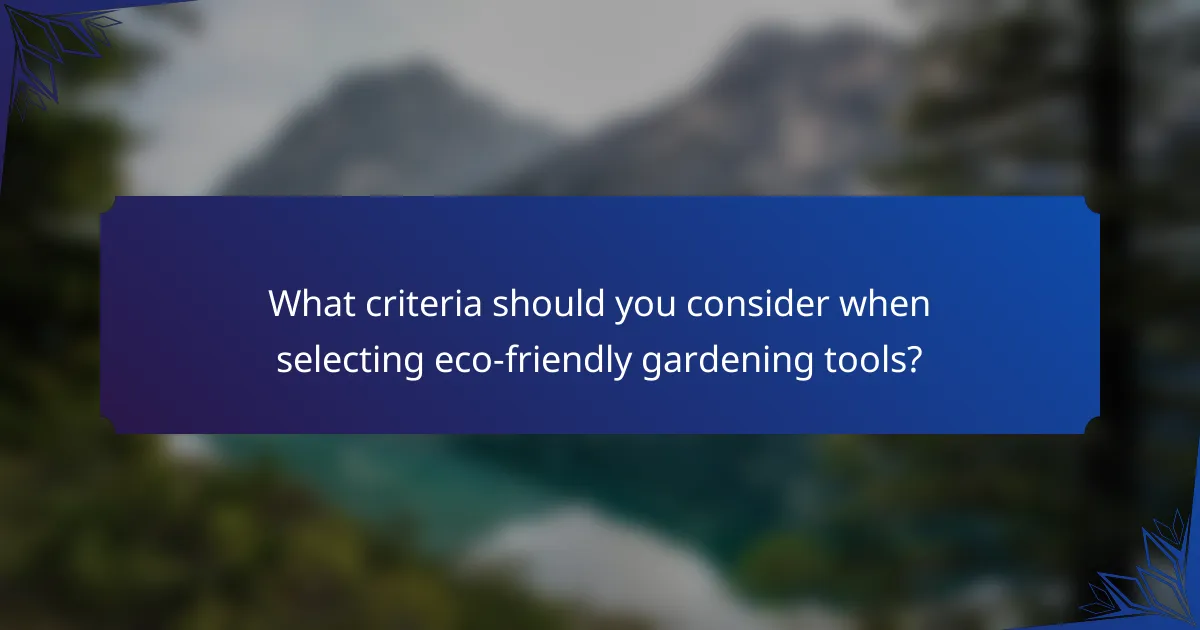
What criteria should you consider when selecting eco-friendly gardening tools?
When selecting eco-friendly gardening tools, focus on their material composition, brand sustainability practices, and overall durability. These criteria ensure that your tools not only perform well but also contribute positively to the environment.
Material Composition
The material composition of gardening tools significantly impacts their environmental footprint. Look for tools made from sustainable materials such as bamboo, recycled metals, or biodegradable plastics. These materials not only reduce waste but also often offer comparable durability to traditional options.
Consider tools that are designed for longevity. For example, stainless steel tools tend to last longer than those made from lower-quality metals, reducing the need for frequent replacements. This durability can lead to lower overall costs and less waste over time.
Brand Sustainability Practices
Investigate the sustainability practices of the brands you are considering. Brands that prioritize eco-friendly manufacturing processes, such as using renewable energy or minimizing water usage, contribute to a more sustainable gardening practice. Look for certifications like Fair Trade or ISO 14001, which indicate a commitment to environmental standards.
Additionally, consider brands that offer repair services or recycling programs for their tools. This not only extends the life of the products but also encourages a circular economy, reducing waste and promoting resource efficiency. Supporting such brands can help you make a positive impact with your gardening choices.
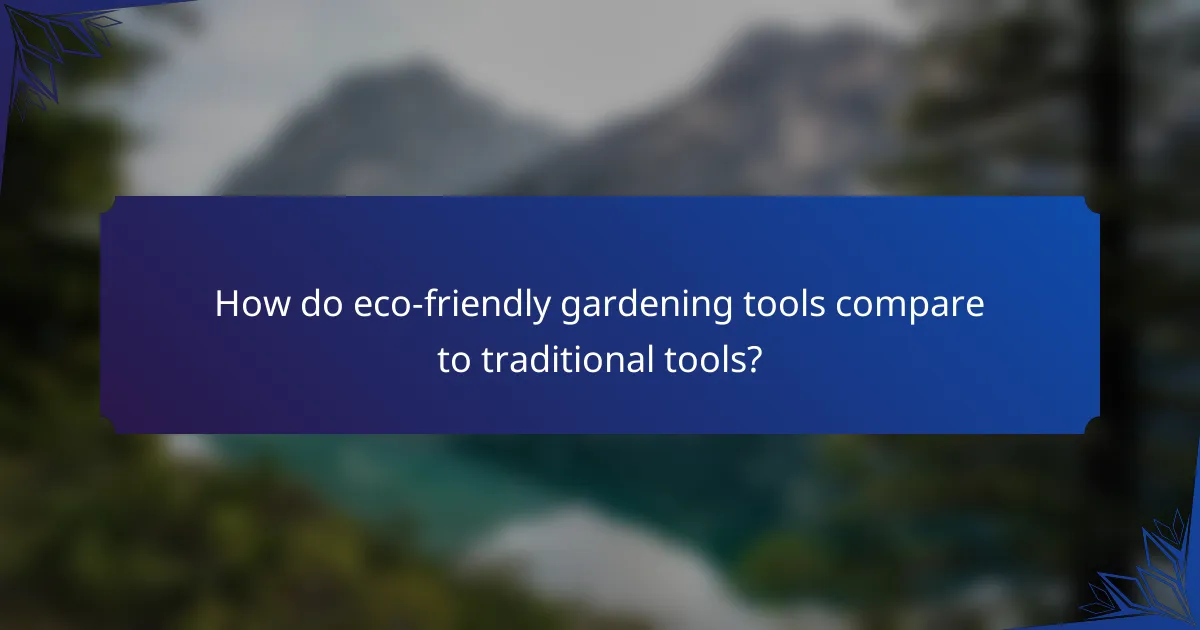
How do eco-friendly gardening tools compare to traditional tools?
Eco-friendly gardening tools often outperform traditional tools in terms of durability, functionality, and sustainability. These tools are typically made from renewable materials and designed to minimize environmental impact while providing effective gardening solutions.
Longevity and Maintenance
Eco-friendly gardening tools are generally built to last, often using materials like bamboo, recycled metals, or bioplastics that resist wear and tear. For instance, bamboo handles can withstand moisture better than wood, reducing the need for frequent replacements.
Maintenance for these tools is usually straightforward. Regular cleaning and occasional oiling of metal parts can extend their lifespan significantly. Avoiding harsh chemicals during cleaning helps maintain their eco-friendly integrity.
Cost-Effectiveness Over Time
While eco-friendly gardening tools may have a higher upfront cost compared to traditional options, they can be more cost-effective in the long run. Their durability means fewer replacements, which can save money over time.
Additionally, many eco-friendly tools are designed for efficiency, allowing users to accomplish tasks faster and with less effort. This can lead to reduced labor costs and time savings, making them a smart investment for avid gardeners.
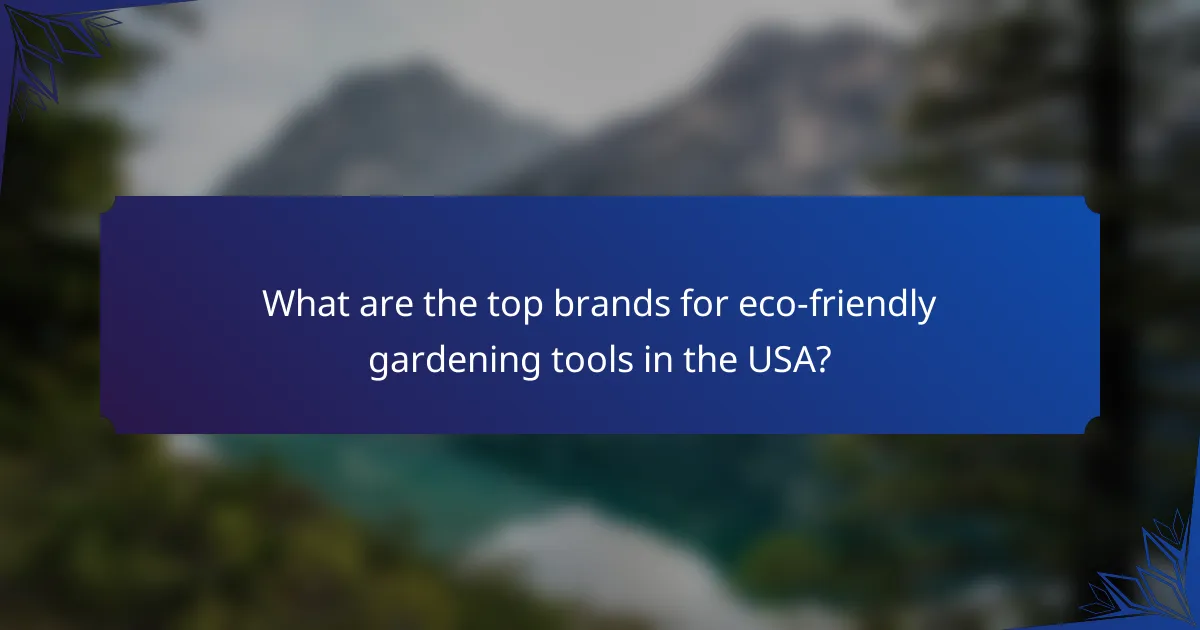
What are the top brands for eco-friendly gardening tools in the USA?
Some of the leading brands for eco-friendly gardening tools in the USA include Greenworks and DeWit. These brands focus on sustainability while ensuring durability and functionality in their products.
Greenworks Tools
Greenworks Tools specializes in battery-powered gardening equipment, promoting a cleaner environment by eliminating gas emissions. Their range includes lawn mowers, trimmers, and blowers, all designed to be efficient and user-friendly.
When considering Greenworks, look for tools that feature lithium-ion batteries, which provide longer run times and faster charging. Their products often come with warranties, ensuring reliability and customer satisfaction.
DeWit Garden Tools
DeWit Garden Tools is renowned for its high-quality hand tools made from sustainable materials, such as steel and wood. Their products are designed for longevity, reducing the need for frequent replacements and minimizing waste.
Choosing DeWit means investing in ergonomically designed tools that enhance comfort during use. Their offerings include trowels, weeders, and cultivators, all crafted to meet the demands of both novice and experienced gardeners.
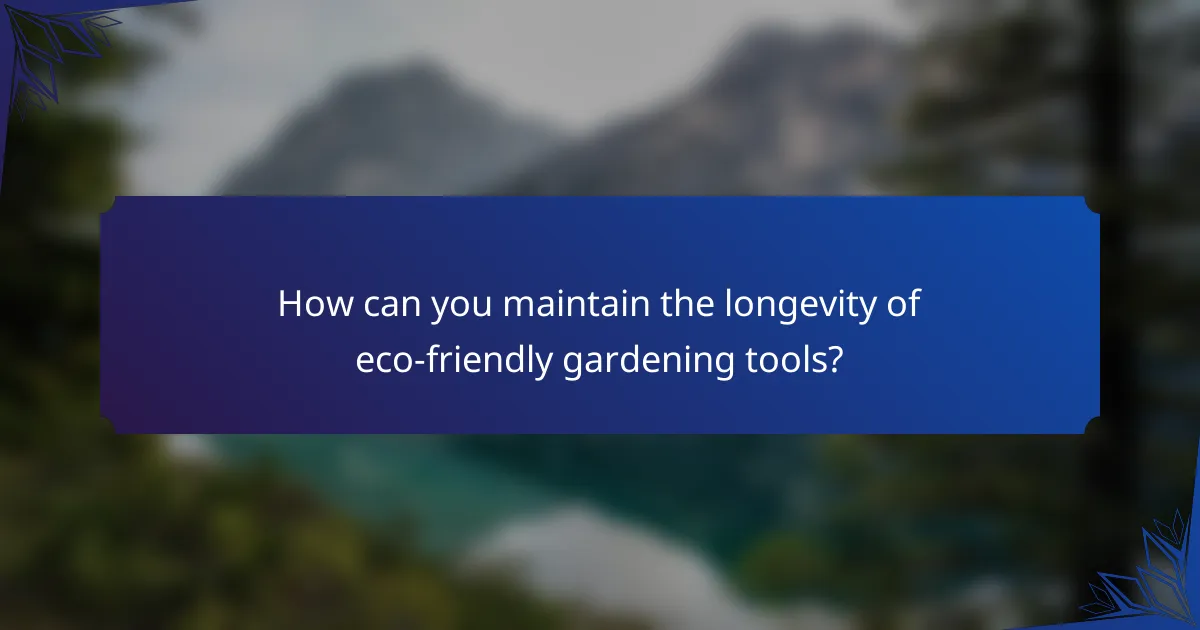
How can you maintain the longevity of eco-friendly gardening tools?
To maintain the longevity of eco-friendly gardening tools, regular cleaning and proper storage are essential. These practices help prevent rust, wear, and degradation, ensuring that your tools remain functional and sustainable over time.
Proper Cleaning Techniques
Cleaning your eco-friendly gardening tools after each use is crucial for their longevity. Use warm, soapy water and a soft brush to remove dirt and debris, avoiding harsh chemicals that can damage materials. Rinse thoroughly and dry immediately to prevent rust, especially on metal parts.
For wooden handles, apply a natural oil, such as linseed or mineral oil, periodically to maintain the wood’s integrity and prevent cracking. This simple step can significantly extend the life of your tools.
Storage Recommendations
Storing your eco-friendly gardening tools properly is vital for their durability. Keep them in a dry, sheltered location to protect them from moisture and extreme temperatures. A dedicated tool shed or a garage works well for this purpose.
Consider using wall-mounted racks or pegboards to store tools off the ground, which helps prevent damage and makes them easily accessible. Additionally, ensure that tools are hung or stored in a way that prevents them from clanging together, which can cause wear and tear.
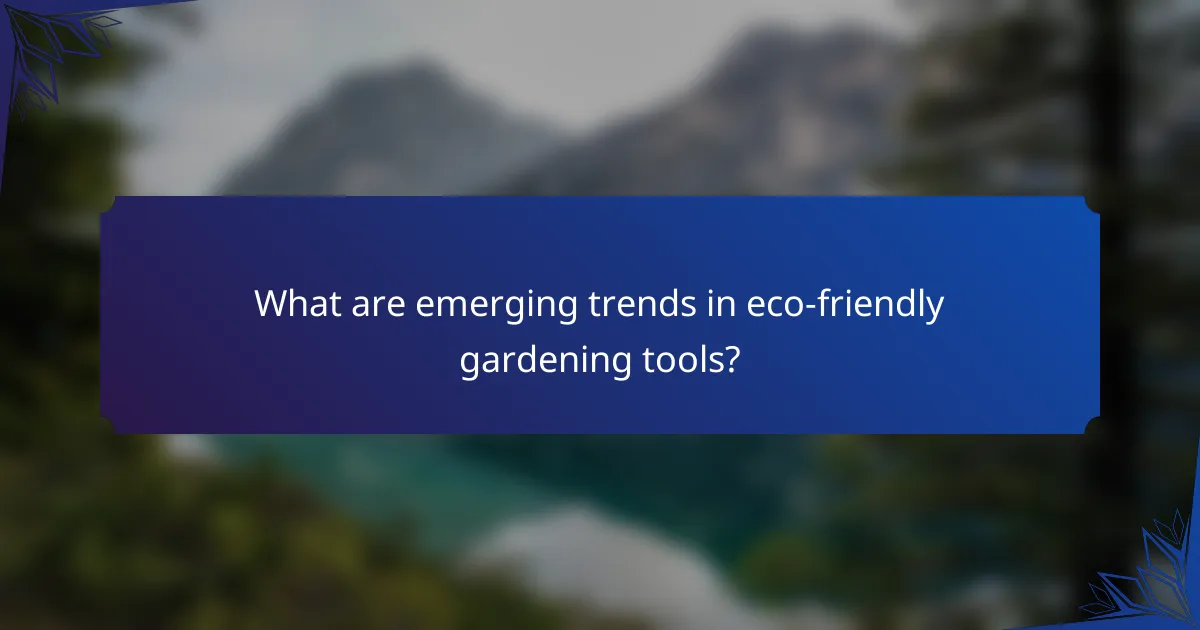
What are emerging trends in eco-friendly gardening tools?
Emerging trends in eco-friendly gardening tools focus on sustainability, efficiency, and technological integration. These tools are designed to minimize environmental impact while enhancing gardening practices through innovative features and materials.
Smart Gardening Technology
Smart gardening technology incorporates digital tools and devices that help gardeners optimize their practices. These technologies often include sensors, automated irrigation systems, and mobile applications that monitor plant health and soil conditions.
For instance, soil moisture sensors can alert you when your plants need watering, reducing water waste. Automated systems can adjust watering schedules based on weather forecasts, ensuring that your garden receives the right amount of hydration without overuse.
When considering smart gardening tools, look for those that are energy-efficient and made from sustainable materials. Many devices now feature solar-powered options, which can further reduce your carbon footprint while maintaining functionality.
